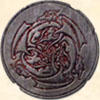Necromancer
A specialist in the school of Necromancy. The necromancer exhibits a fascination with life and death that borders on the obsessive. He is typically brooding, humorless, and withdrawn. Casual acquaintances consider him to be cold and hostile, but those who befriend the necromancer may come to know him as a caring, complex individual whose emotions run deep. The necromancer can be a valued and trustworthy companion, but he is also prone to bouts of depression so extreme that it becomes difficult for him to interact with others to any meaningful degree.
Befriending a necromancer will try the patience of even the most understanding character. Since necromancers prefer solitude to companionship, and silence to conversation, it is little wonder that few of them have spouses; the best mate for a necromancer is another necromancer.
In spite of their reticence, most good- aligned necromancers are unshakable in their determination to confront and extinguish evil and will join like-minded individuals to undertake these types of missions. Understandably, necromancers make poor leaders, but they are valuable additions to adventuring parties. Not only do necromancers wield unmatched power, their familiarity with the world's dark forces makes them virtually fearless. On the other hand, much to a leader's chagrin, a necromancer does not always follow orders automatically; a necromancer who disagrees with his party's strategy may simply strike out on his own.
Necromancers live as far from civilized regions as they can, establishing residences in ancient castles, deep caverns, or even abandoned crypts. They spend most of their time engaged in arcane research, reading, studying, and writing.
Necromancers seldom have careers, though they occasionally earn money as teachers and mercenaries. High-level necromancers simply order undead creatures to fetch them treasure when funds are low
Allowed Races:Only the spirits of humans incorporate the energies necessary to master the spells of necromancy. Therefore, only humans are eligible to become necromancers.
Ability Requirements: Since only the most enlightened, strong-willed, and intuitive wizards can become specialists of this school, necromancers must have a minimum Wisdom of 16.
Saving Throw Modifiers: All opponents modify their saving throws by -1 when attempting to save against a necromancy spell cast by a necromancer, or against an attack from an undead creature either created or controlled by a necromancer. A necromancer adds a +1 bonus when saving against necromancy spells, or against any attacks made by undead creatures.
Bonus Spells and Acquired Powers: A necromancer can memorize an extra spell at each spell level, providing that at least one of the memorized spells is from the school of necromancy. When a necromancer reaches 17th level, he adds another +1 bonus when saving against necromancy spells or against any attacks made by undead creatures. With his natural +1 bonus, this effectively raises his saving throw bonus to +2.
When a necromancer reaches 20th level, he gains the ability to cast a special form of speak with dead once per day. To cast the spell, the necromancer must merely point to the subject and concentrate for one round; no verbal or material components are necessary. The spell enables the necromancer to ask questions of a single dead creature and receive answers according to the knowledge of that creature. The creature can not have died more than 100 years ago, and the caster must be able to converse in a language that the dead creature formerly used. The necromancer can converse with the dead creature for one full turn and can ask up to four questions.
Regardless of the creature's level or alignment, it receives no saving throw against this spell. However, the creature will be as evasive as possible, tending to give brief and sometimes cryptic answers.
Additionally, the creature's knowledge is usually confined to what it knew in life (it cannot convey information about what may have happened to it after its death).
Oppositional Schools: The necromancer cannot learn spells from the schools of illusion and enchantment / charm.
Ethos:Continual exposure to forces associated with undead creatures can have a corrupting effect on wizards with even the slightest inclinations toward evil. Consequently, the number of evil-aligned necromancers is rumored to far outweigh the number of those of good alignment. Neutral necromancers are virtually non-existent; in general, a necromancer either has a will strong enough to resist the lure of darkness, or he submits to the corruption and devotes himself to a life of evil.
